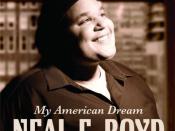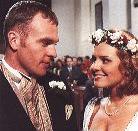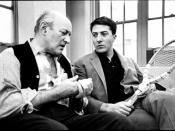In the play The Death of a Salesman, the character relations and development are the most important and prominent element within the play. From muddied, confused ideas of dreams and reality, to failures of communication and outside relations, to even the simple events leading to his death, Willy is a layered character all throughout the play. To follow his slow regression is a matter of real thought on his relations with his family and all the things that have impeded his "success" as a salesman, father, and husband. Sixty-three-year-old Willy Loman was a simple, family man but his obsession with his dreams and failures led to his untimely suicide.
The most blatant constituent in Willy's psychological state is his obsession with his dreams, it's relation to the American Dream, and how his reality is a harsh opposition to those ideals. Willy's character is wrapped in a desperate clamoring toward some sort of climactic point, all in which his position, in reality, lends itself to.
C.W.E. Bigsby says in an essay on the play, "[Willy] Loman discovers spiritual nourishment in his fantasies like a man caving into his own world to protect the remnants of his dignity" (72). I think this notion of dignity is a very strong truth in the play. As Willy sees Happy and Biff grow up outside of his ideals of success, he feels he has failed them and retreats to his fantasies to fill the gaps that lie between his sons and himself. He becomes clouded by the idea that love is an item to be bought. He had envisioned himself, at earlier points in his life, as a distinguished, well respected salesman that could support his family (pay insurance) and would make his sons proud enough to want to follow in his footsteps. This...


